CLEARING AWAY THE FOG
 ONE MORE VOICE TO ADD TO THE GROWING RANKS OF BLOGGERS -----
comments welcome - vincent1@twcny.rr.com
ONE MORE VOICE TO ADD TO THE GROWING RANKS OF BLOGGERS -----
comments welcome - vincent1@twcny.rr.com
Sunday, April 09, 2006
Saturday, April 01, 2006
State of the Union
When I was a boy growing up I wondered if I would see the twenty-first century. Well now that I have made it I find myself in a world that I could not possibly have foreseen. It is not a pretty picture. Our country's leaders have lead us and much of the world into a cruel morass of senseless violence. I am deeply discouraged by the fact that the inept band holding power in Washington will remain in charge for over two more years. It should be evident to even his most partisan supporters that George W. Bush has neither the intellect nor temperment to hold our country's highest office.
We can only hope that a truly qualified leader will emerge in 2008. The candidate need not be charismatic. Nor must he or she be a Democrat or Republican. How the election process will be conducted and the quality of the person elected will determine the future of our country and will be judged by nations throughout the world.
Friday, September 30, 2005
Make Some Hard Choices Mr. President

Where it hurts
Winning the war in Iraq was once predicted by a high level administration official to be a slam dunk. Not so. It has stubbornly persisted for two and a half years with no end in sight. As in all wars, the burden of this conflict falls disproportionally on the young soldiers who patrol hostile enemy territory, exposing themselves to sniper fire and booby traps. Casualties sustained by American troops continue to mount. Over 90% of the total number of these casualties occurred since the day that Baghdad fell and the administration announced that the war had been won.
Then of course there is the killing of tens and possibly hundreds of thousand of non-combat Iraqui citizens and the cruel disruption of their family lives. This is a subject rarely touched upon in any of the President's public pronouncements.
You're alright Jack
There are many who have profited by this war. They are principally wealthy individuals and corporations who have influence with cronies in high places --- they include the Haliburtons, the munitions and weapons manufacturers, and long time friends and former colleagues in the petroleum industry.
As for the average Amereican, until this summer the burden of the Iraq war did not seriously interfere with his or her daily life. Despite the ongoing carnage, President Bush studiously avoided any hint that the general public might be asked to make sacrifices.
Reality sets in
But now that gasoline prices are spiraling upward in the direction of four dollars a gallon, the President is hearing loud outcries of protest from the electorate. His popularity is waning even among his strongest supporters. Now is his opportunity to show political courage and tell all Americans that they must be willing to make painful sacrifices in the name of patriotism. He should begin by urging Congress to enact legislation mandating the rationing of gasoline based upon genuine need. A program of this kind was extremely effective during the Second World War and it can be improved upon and made even more effective. Secondly, stronger tax incentives should be put in place to encourage the purchase of hybrids and other vehicles that consume less gasoline. Conversely the outrageous and senseless tax write-offs given to owners of oversized S.U.V.'s should be repealed.
Perhaps these mesures will make Americans more likely to feel they are participating in the war effort. It should also cause them to reflect upon the price that must be paid to finance its continuance.
___________________________________________
Note --credit for cartoon goes to Bill Mauldin
World War II cartoonist ---1921-2003)
Wednesday, June 22, 2005
A French Ancestor Provides Tough Love
This is written in recognition of Catherine Zeline Megnin, known to our family simply as Aunty.
Her life began in 1842 on a small farm in a the tiny township of Chulay, France --- not far from the Swiss border. Her record of birth was certified by Chulay's mayor, whose surname was also Megnin. When Aunty was a child, her parents, seeking greater opportunity in America than could be realized on their little farm, disposed of all of their possessions and booked passage for the family on a vessel bound for New York City.
While Aunty's father found work in America as a stonecutter, Aunty opened a laundry business that washed and ironed the lace curtains and fine clothing sought after by Manhattan's emerging upper class. By dint of hard work, keen intelligence and extreme frugality, Aunty soon accumulated considerable wealth. An instinctive capitalist, she foresaw the growth of New York City and invested wisely in undeveloped real estate in the Bronx.
Meanwhile, domestic trouble was brewing back in Chulay, threatening the well being of her two young nephews, Eugene and George Emil Megnin. It seems their mother had forsaken her family responsibilities and in a burst of passion had run off with a lover. Aunty came to the rescue of the motherless boys by paying for their passage to America where they were taken under her protective umbrella.
Aunty's role as benefactoress continued after George Emil married Maria Koethe, a recent immigrant of Danish and German descent. Their union produced seven children - my mother Marie, and six boys. Aunty had two houses built side by side in the Bronx, one occupied by herself, her husband (of whom little is known), Aunty's mother and Marie. George Emil, his wife Maria and the six boys lived in the other. George Emil was a good man who made a modest living creating rug designs and selling them out of his home. However, when a check from a rug manufacturer arrived in the mail, on a number of occasions he succumbed to a powerful urge to flee from the household. In these instances, his wife Maria formed a search party, consisting largely of their children, who were commissioned to scour the neighborhood taverns for their errant father. George Emil never strayed far and was always located following a few days of absence. He returned home in disgrace, but was soon forgiven by his children and eventually by his wife.
My mother, Marie, told me that living in the same house with Aunty was strictly regimented. The door was locked at 9:00 p.m. Should my mother miss the deadline she was denied admittance and obliged to go next door to find a place to sleep in the adjacent house occupied by her parents and six brothers.
On Saturday night Aunty would take a hot bath. My mother would bathe as well. She was told to step into the same, now luke warm bathwater in which Aunty had previously been immersed. That is the way personal hygiene was practiced around the turn of the 20th century.
In 1915 Aunty, then 73 years old, decided to move the family from the Bronx to Allendale, a town in rural northern New Jersey. She purchased a large parcel of land and built an impressive house which was in later days converted into a tavern. It stands to this day.
When Aunty died in her late eighties, she still owned considerable property. Her will tied much of it up in trust, with the income to be shared for the lifetime benefit of her nephews George Emil and Eugene. Aunty was motivated by fear that Eugene's share of the estate, if given to him outright, would be wasted by Eugene's wife who had a weakness for whiskey, cigarettes and romantic escapades.
Aunty was a wise, practical and no nonsense sort of woman. A leader, Aunty stood out in a man's world long before the word feminism came into vogue.
Tuesday, May 17, 2005
About Patriotism, Common Sense and the War in Iraq
� Patriotism is not the exclusive province of any one political, religious or philosophical group.
� It was a mistake for the administration to invade Iraq. We have made many more enemies than friends. Stated differently, the costs, however measured, greatly outweigh the benefits.
� The men and women who make up our armed forces are deserving of our respect, gratitude and support.

� In World War II civilians sacrificed to further the war effort. There was gas and food rationing, victory gardens and the promotion of war bonds. In this war the sacrifices are primarily being made by young people who joined the military to seek a better life. At a minimum the nation as a whole should take measures to reduce our dependence on foreign oil. One approach would be for Congress to enact laws that would impose tax penalties and provide monetary incentives designed to encourage consumers to purchase hybrid and other gasoline efficient vehicles.
� Whatever the basis for our country�s unilateral act of aggression, we find ourselves stuck in a quagmire, outnumbered by people who by and large do not like or understand us or our culture.
� It is widely believed throughout our nation and the world at large that we need to get out of Iraq. The paramount question is when and how without adding to the chaos that now exists in the Middle East. This is a complex problem that will not be solved by extreme partisanship and name calling.
� Since it is becoming evident that the war in Iraq and Afghanistan may well continue for many more years, we should begin developing plans to implement the draft.
� In this era of nuclear weapons, we must consult with our allies and be willing to talk to our enemies, all the while making every effort to maintain military superiority. In the long run, all people inhabiting our planet will need an improved version of the United Nations or its equivalent if we are to avoid self-destruction.
Tuesday, February 22, 2005
A largely unappreciated sports event---the Big East Track & Field Meet
This year Syracuse University again hosted the Big East Track & Field competition at the Carrier Dome. Teams from colleges that regularly produce first rate track programs such as Notre Dame, Georgetotwn, and Rutgers entered quality athletes in a wide variety of events. Syracuse lacked the depth of talent possessed by these schools but captured first place in the men's sixty meter dash and showed considerable promise in the women's field events.

woman sprinter
Posted by Hello
I attended and had a good time. The price was right. Admission was a mere five dollars for a seat near the finish line. Parenthetically, a football ticket in midfield would have cost at least ten times that much.
There was plenty of room in the stands to stretch my legs. No one spilled beer on my clothes. The meet was not interrupted by annoying commercials.
I am of course aware that football is thought by most to be a considerably more
glamorous sport than track. Yet I wondered why games making up Syracuse's unexciting football schedule managed to attract some 40,000 fans last year while a highly competitive Big East track meet in the same stadium enticed only a couple of hundred spectators.
The great disparity in the number of onlookers was in my opinion in large part due to the fact that college track in Central New York is not sufficiently publicized. Before the date of the Big East meet only one article of significance appeared in the Syracuse Post Standard. There were no �up close and personal� interviews of featured athletes. If there was any television coverage it had to be minimal. Simply stated, there was no incentive for sport fans to turn out for a track team made up of faceless competitors. Compare that with the ongoing media attention given to the university's major sports, football and basketball and the growing interest in lacrosse.
Syracuse has for several years been the host city for the Big East Track & Field meet and will continue to play this role in the foreseeable future. A good host should be attentive to its guests. It is something of an embarrassment to see so few present to cheer on these highly trained athletes in a competition that traces its origins to ancient Greece.
Once exposed to the experience of watching a good track meet,the next step is to learn about the contestants and the teams. With knowledge of the sport, appreciation follows. Those who take the time to look into the intricacies of track and field will have found an ongoing source of low cost and highly satisfying entertainment.
Saturday, October 30, 2004
WHERE ARE THE PEACEMAKERS?
As the result of the carnage and devastation caused by World War I, in which some ten million soldiers died and another twenty-one million were injured, the League of Nations was established as a means of resolving international disputes and ending world conflict. This well-meaning venture never received the full support of the United States and after Germany and Japan withdrew from the organization in 1933 its effectiveness as a deterrent to war was nonexistent.
World War II resulted in an estimated 61 million miliary and civilian deaths throughout the globe. The introduction of nuclear weaponry by the United States and the Soviet Union threatened world destruction in a manner never before contemplated. It was evident to all that there would be no winners if the major powers were to engage in a nuclear battle. Motivated perhaps by reasoned fear more than anything else, in 1945 the concept of a supranational peacekeeping organization was revived in the form of the United Nations. This body has been widely criticized in the United States, principally by short-sighted constituencies that distrust foreign influences and believe that our nation should adopt an aggressive world leadership role. It is a dangerous fallacy to believe that because the League of Nations and the United Nations have not met all of the aspirations of their founders, the concept of an international body dedicated to peace should be abandoned. Despite its inadequacies, the peacekeeping efforts of the U.N. have played an important role in deterring a number of military conflicts involving smaller nations and have in a significant way helped to keep the world from another nuclear conflagration.
Now we are faced with even greater threats to the safety of our country and to the world. Nations such as North Korea and Iran now have or will in the near future possess the capability of attacking us with nuclear weapons. Other countries will follow on their heels.
 Rapidly changing technologies will permit the creation of small nuclear �smart bombs� capable of being secreted by terrorists into our major cities.
Rapidly changing technologies will permit the creation of small nuclear �smart bombs� capable of being secreted by terrorists into our major cities.
What this means is that, while preserving military superiority,we can no longer afford to foolishly make enemies, whether such enemies be Muslims or any other ethnic, religious or national group. Enemies sap our economic strength and diminish our ability to play a leadership role in world affairs. The invasion of Iraq was a terrible miscalculation. It served to turn the Arab world against us and highlighted the limits to our country�s power. This has emboldened others who based upon real or imagined grievances, would do us harm.
There were many important but politically sensitive issues that were never discussed in the recent Presidential campaign. Neither candidate provided a short or long-range plan for world peace. Neither discussed in any meaningful and understandable fashion how he felt about the future of the United Nations. Can this organization be restructured and refinanced so as to transform it into an effective deterrent to another world war? Ignored as well in the campaign debates was there any dialogue about how the Palestine question might be resolved. While defending the security of Israel, will we continue to ignore the need of Palestinians to establish their own financially viable sovereign state?
It is easy to start a war. It is much more difficult to create a just and lasting peace. More than ever the world needs peacemakers. Will they please step forward?

Thursday, September 16, 2004
What do you know about really WILD mushrooms?
Be not rigid in your unwillingness to eat a mushroom you have picked in the woods. There are some species that even a rank amateur can classify as edible and suitable for the table. Others of course can make a person nauseous or worse.
It is my considered opinion that if an outdoorsman pays no heed to the fungi sprouting from soil and wood, this individual is missing a great source of satisfaction and fun.
To whet the reader's curiousity and perhaps his or her appetite, I am picturing a few edible mushrooms and some poisonous ones. If you can correctly tell which can be consumed for supper and which should be photographed but never eaten, you will not receive a prize. However, you will have gained the respect of the trolls hiding in the darkened forest. The answers appear below.
1.

2.
 3.
3.
4.
 5.
5.
6.
 7.
7. 8.
8.
9.

______________________________________________________________________________
Answers
1. Deadly amanita- A big bite can do you in.
2. Chanterelle - Wonderful with veal.
3. King bolete - Prized as choice world wide.
4. Jack-O-Lantern - It put my brother in the hospital overnight - can be confused with the chanterelle.
5. Yellow morel - The best!
6. Honey mushroom - Grows on wood - tasty - parboil before serious cooking.
7. Glistening inky cap - Found on rotted stumps - great in an omelette.
8. Chicken of the woods - Yellow and orange color of fresh specimens stand out on tree trunks - delectable when fully cooked.
9. Stinkhorn (in Latin "phallus impudicus")- Ugh!
First timers should use caution before consuming. Join a local mushroom club or check out fungus in a reliable book such as "National Audubon Field Guide to Mushrooms" by Gary A. Lincoff.
Thursday, August 12, 2004
The formation of political allegiance
I shall discuss, in random fashion, some of the influences that have formed my current political thinking.
While growing up in Brooklyn, the relatives I saw most frequently were Irish/Catholic/Democrats. Individuals falling outside this category were said to be "not one of our kind." The great majority of my ancestors were working folk --- none to my knowledge had ever attended college. My father was a voracious reader of such papers as the Broklyn Eagle, the Herald Tribune and the Daily News. However, I do not believe the small book shelf in our living room contained more that ten or so hard covered volumes.
While in the National Guard, my father had served on the military staffs of two Democrat governors, Alfred E. Smith and Franklin Delano Roosevelt. At sometime or other he had obtained their autographed photos which he had framed and hung on a wall in our living room. When Smith and Roosevelt split as the result of their conflicting political ambitions, my father took down Al Smith's picture and relegated it to the closet. When it came to political choices, relgion did not rule the day.
In the course of attending Holy Innocents grammar school, my brother and I were persuaded to join the Catholic Boys Brigade. We were outfitted in militaristic khaki uniforms festooned with purple velvet epaulets and gold buttons.
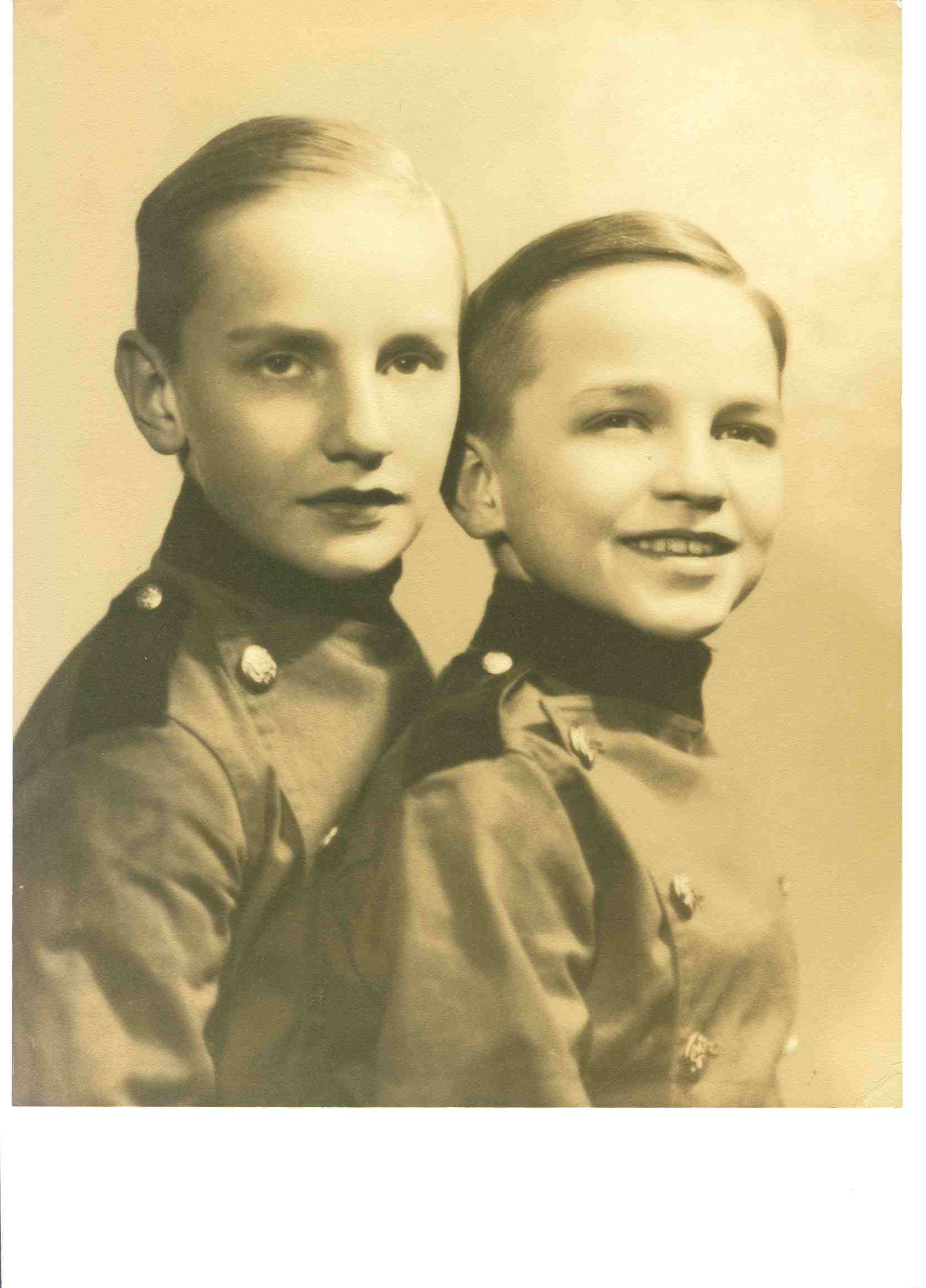 A regiment was formed that met in the basement of the church. The Brigade was presumably an attempt by the Catholic authorities to offer an alternative to the Boy Scouts, which was widely believed to be under the conspiratorial thumb of Protestants. Our meetings largely consisted of marching up and down in lock step not unlike the young fascists appearing in the newsreels of the day. Fortunately, the organization's life was brief.
A regiment was formed that met in the basement of the church. The Brigade was presumably an attempt by the Catholic authorities to offer an alternative to the Boy Scouts, which was widely believed to be under the conspiratorial thumb of Protestants. Our meetings largely consisted of marching up and down in lock step not unlike the young fascists appearing in the newsreels of the day. Fortunately, the organization's life was brief.In 1939 our family moved to Allendale, New Jersey. In this rural area, nearly everyone, including my mother's parents and six brothers, were Republicans. Nevertheless, my early political imprint caused me to speak out on behalf of F.D.R. when he ran against Wendell Willkie. (Willkie was an internationalist who would most likely be scorned by the Republican party of today.)
In Allendale I joined the Boy Scouts and met a number of agreeable Republican/Protestants. I was elevated to the rank of Life Scout, and was chosen to be leader of the Wolf Patrol. How sweet it was. In those uncomplicated days, politics were hardly ever discussed.
Upon turning 18, I cast my first vote in the Presidential election pitting Harry Truman against Tom Dewey. I remember entering the voting booth in a total state of confusion. I knew little of the issues. Impulsively, I put aside my Democratic heritage and voted for Governor Dewey, the only Republican Presidential candidate who has ever received my vote. Later, I would have voted for Dwight Eisenhower, were it not for the marvellous eloquence of Adlai Stevenson.
Now that I have revealed my persistent Democratic voting pattern, I suppose the reader could call me intransigent or liberal or hopelessly biased. Perhaps I fall in one or more of these categories. However, at some point in the future it is not at all out of the question that I shall vote for someone other than a Democrat for the nation's highest office. It will not happen this year.
Monday, April 05, 2004
Recalling an Earlier Time
It was 1939. I was twelve years old. My parents and younger brother Rob had that year relocated from an apartment in Brooklyn, New York, to a small red brick house in Allendale, New Jersey, that was owned by my mother�s parents.
Within the ensuing year, our family fabric was dealt a devastating blow by the sudden death of my father. While he had successfully managed to hold on to a responsible job throughout the depression years, when he died he had only a small amount in the bank and left my mother little beyond a five thousand ($5,000) dollar life insurance policy and a 1939 Chevrolet sedan. Mom was determined to get a job. She went to business school and updated typing and shorthand skills she had mastered before she met my father. She was offered and accepted a position as a secretary from dad�s employer, the Westinghouse Elevator Company, with a starting pay of forty dollars ($40.00) a week. She arose each working day at 5:45 a.m. in order to catch the 7:12 a.m. Erie Railroad steam powered train to Jersey City, returning to the Allendale station at 6:45 p.m.at night. From Monday through Friday my determined and energetic grandma prepared all the meals, did the laundry and ran the household. She also kept a wary eye on the activities of my brother and me.
It was our good fortune in the sad months that followed the loss of our father that we received comfort from family members who were ready to help when called upon. In large part they made it possible for my brother and me to regain much of the sense of security that had been undermined by my father�s death.
Help came from another quarter. John McNally and his three younger brothers had also recently moved to Allendale from the New York City area. The O�Neil and MCNally boys lived less than a quarter of a mile apart, allowing the organization of a game of touch football in the fall or a hockey match in the winter on short notice.
We had much in common. We were all raised and greatly influenced by a loving mother and no-nonsense but caring grandmothers. Money was tight. John�s family raised chickens that provided eggs for breakfast and drumsticks for Sunday dinner. The O�Neil boys were nourished in large part by the output from their grandpa�s wartime �victory garden� preserved in airtight glass jars by our enterprising grandma.
We all attended Ramsey High School, which was housed in a solid brick structure, styled with attractive colonial architecture. It had been built in the 1930's with W.P.A. money distributed under F.D.R.�s new deal. My class was largely made up of white anglo-Saxon Protestants with but a sprinkling of Catholics, a solitary Jew, and not a single African American out of the some 130 incoming students.
In my senior year at Ramsey High, I played on the varsity football team and had a girl friend. Despite the limitations imposed on travel by gas rationing, my mother would often let me drive the family car on dates. Life had taken a decided turn for the better.
It was the spring of 1945; the Second World War was winding down. The Germans surrendered in May but the Japanese adamantly refused to put down their arms. My idyllic life was soon to change. I faced the unpleasant prospect of being drafted. Since the role of infantryman held little appeal, I enlisted in the Naval Reserve, and was sent to the Great Lakes Naval Training Station where I was scheduled to learn how to be a radio technician, a vocation for which I had virtually no aptitude.
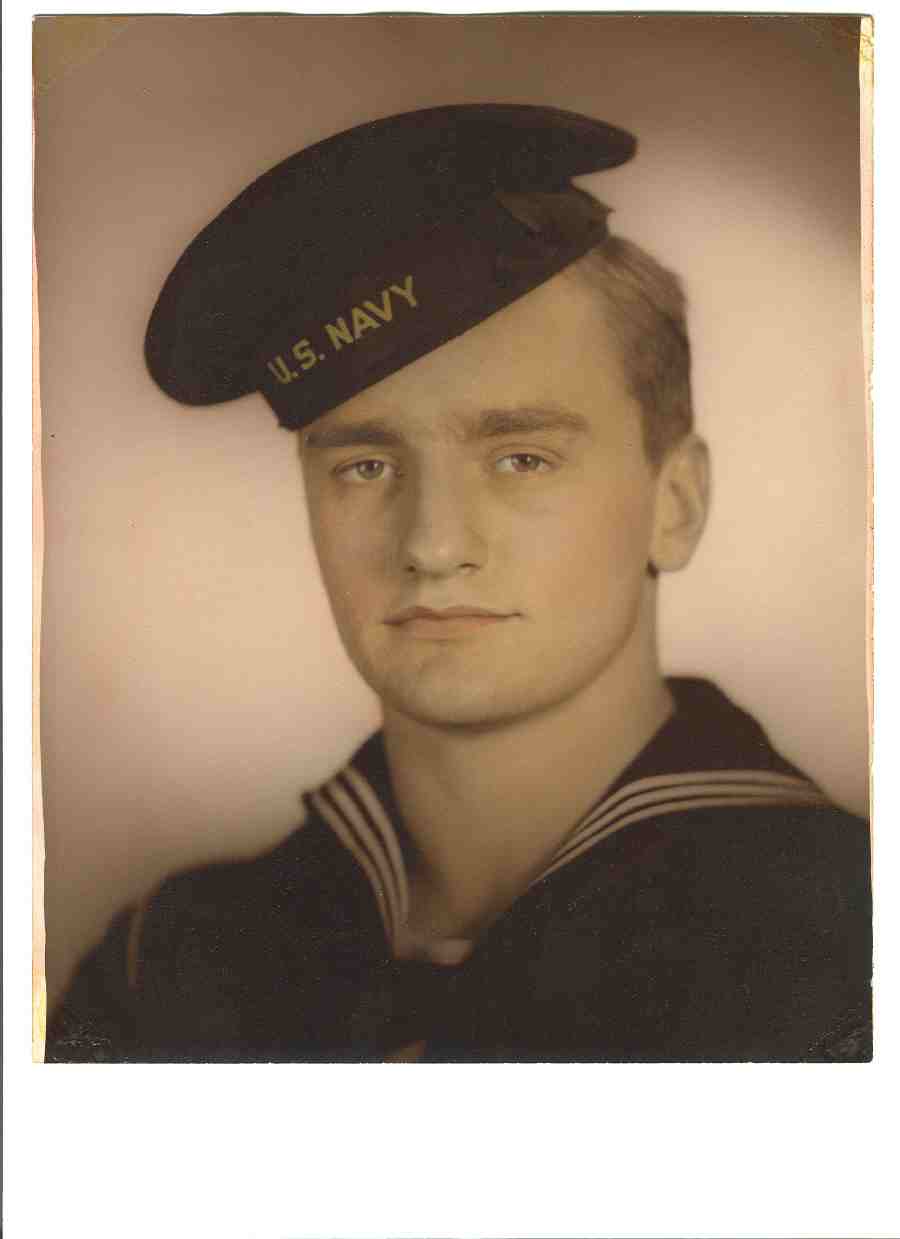
I remember marching on the parade ground on August 15, 1945, nine days after the United States had dropped an atomic bomb on Hiroshima, when a message was broadcast over the loud speaker system telling us that the Japanese surrendered. The release of that powerful bomb into the heart of a city of 350,000 men, women and children was a fearsome moment in history. It would alter how world leaders thought about full scale warfare and would create a nuclear standoff in the rivalry that later emerged between the Soviet Union and the United States. But to rank and file servicemen such as myself, it would mean a welcome return to civilian life.
My boyhood friend John McNally chose a different path. He attended the Naval Academy, made a successful career as a naval officer and rose to the rank of Captain. We both married, raised families and kept in touch over the years.
Last month, eleven of Ramsey High School�s class of 1945 convened in Venice, Florida, to celebrate the four years of our lives that brought us together. It was apparent that we all regarded our high school experience as a special time. Wes Clapp, a retired physician and a man of strong religious faith, said we had been blessed. After tentative greetings.and some hesitancy about connecting names with faces, we soon attained a comfort level. Over the three days we spent in each other�s company, our conversations managed to span the gap of some sixty years. We reminded one another of episodes we had long forgotten. Many provoked laughter; other recollections were poignant. We remembered those classmates who had passed on. Wes formalized the occasion with a prayer. We left telling one another we would meet again next year. It might just happen.
Wednesday, January 28, 2004
THE PASSING OF A MEMORABLE TELEVISION PERSONALITY
Jack Parr died this past week at the age of 85. He was a whimsical, gentle and insightful man who brought out the best in television from 1957 to 1962.
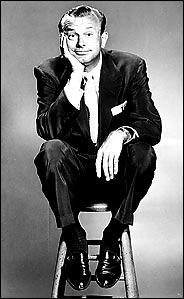 Our daughter Carol was born in 1959. Virtually every weekday night of Carol's young life, she was fed or rocked to sleep as my wife and I enjoyed Jack and his wide array of guests. Our favorite was Jonathan Winters who with his wildly spontaneous brand of comedy created so many unforgetable characters.
Our daughter Carol was born in 1959. Virtually every weekday night of Carol's young life, she was fed or rocked to sleep as my wife and I enjoyed Jack and his wide array of guests. Our favorite was Jonathan Winters who with his wildly spontaneous brand of comedy created so many unforgetable characters. 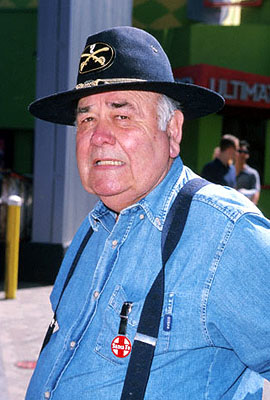 Unlike the comics of today, Jack's wit did not depend upon smut or cruel personal ridicule. Those of us who were fortunate enough to be among his viewers will remember Jack Parr for the pleasure he gave us, We respect him, not only for his special talent, but for his underlying sense of decency.
Unlike the comics of today, Jack's wit did not depend upon smut or cruel personal ridicule. Those of us who were fortunate enough to be among his viewers will remember Jack Parr for the pleasure he gave us, We respect him, not only for his special talent, but for his underlying sense of decency.
Saturday, November 01, 2003
A FAMILY REMEMBRANCE

I awoke this morning thinking of my father. He has been gone from this world for sixty three years. Until today, his memory lay dormant in a remote corner of my mind.
He died without warning of a heart attack on a spring day in 1940. He left surviving his wife Marie, 39 years old, and his two sons, Vincent, age 13, and Robert, age 12. Our sense of loss was traumatic. It was as if the Almighty had taken our world, shook it and turned it upside down. A feeling of deep anguish entered my psyche on the day he died. It left me with a nagging realization that our family life and the world at large would never be the same.
In the months after his death Dad would sometimes appear in my dreams. On one occasion, I remember visualizing him shaving in the bathroom. I looked up at him and asked where he had been. He appeared youthful and animated. He told me he had been on a long journey but now he had come back to his family for good. I inquired no further and when I awoke, for a while I felt oddly comforted by his words and presence.
From all accounts, Dad�s life was a fulfilling one. He was born in 1892, a year before the invention of the gasoline powered automobile and eleven years before the Wright brothers flew the first successful airplane. There was no money in the family to pay for college and jobs were scarce, so Dad joined the army. Under the command of General �Black Jack� Pershing he was assigned to the Mexican border where he took part in fighting against the uprising initiated by �Poncho� Villa. When the United States declared war against Germany in 1917, he fought with the 105th field artillery in France, receiving the Silver Star Medal for gallantry in action.
When the war ended, Dad returned to civilian life. He found a job with the A.B. See Elevator Company, met and married my mother and eventually acquired the title of �Purchasing Agent� for that company and its successor, Westinghouse,
What I best remember about my father was his ability to have fun and his eagerness to share his enjoyment with family and friends. On a modest salary, he managed to take Mom to every Broadway musical comedy that came along. One of the family�s most valued possessions was a baby grand piano that Dad had bought for Mom soon after they married. The piano bench was crammed with sheet music featuring the melodies of Cole Porter, Rogers & Hart and other great songwriters of that era. I can hear today Dad�s strong baritone voice ringing out in our Brooklyn apartment,
leading in song all who assembled around the piano, which Mom played with talent and feeling.
Dad retained a military connection with the New York National Guard. He was �Army� through and through and in the fall the family would on selected Saturdays embark on the Hudson River Day Line and travel to West Point to watch the cadets play football. During those years, I knew the name of every player on the Army team, recording the victories and defeats by clipping newspaper accounts and faithfully pasting them in my scrapbook.
While Dad never owned a house, he managed to put together enough money to buy an unpretentious little bungalow on the ocean. It was located at a beach colony known as Breezy Point and it was our home every summer. The rooms were tiny and we had no hot water. I remember Dad resting on a wooden chaise on the deck of the bungalow, wearing his wool bathing suit, all the while chatting amiably, sipping a Tom Collins and smoking a cigarette.
In 1939 Dad sold the bungalow and took Mom on a trip to Europe. In the same year, he had moved our family from Brooklyn to live with my grandparents in their house in rural New Jersey. We later learned that his doctor had told Dad he needed a less stressful environment..
My father and I took a walk one Sunday afternoon a few weeks before he died. He told me he could not afford to send my brother and I to an expensive university but that it was important that we go to college. He said he would somehow make this happen. Although his involvement with our lives came to an end shortly thereafter, his spirit remained with us and the goals he set for us were achieved.
_______________________

SEEKING ORDER IN A DISJOINTED WORLD
I offer this photo of a quiet Ontario lake surrounded by the muted colors of fall foliage. May it provide a small measure of respite from the real and artificial urgencies of contemporary life. As an antidote to malaise caused by the ceaseless alarms sounded by television journalists, I encourage a foray into the solitude and beauty offered by the natural world.
Periodic escapes of this kind are restorative and help to put a person's head on straight.
It is not that cities are inherently inimical to peace of mind. The great inspirational museums are of course located in our major cities. Delightful pocket parks can be found hidden away in populous Manhattan - providing quiet places of refuge from street noise. The principal cities of the world were created by visionaries who knew about the need for scenic boulevards and noble edifices designed to provide sustenance for the human soul.
Today, of course, our cities, particularly those located in the northeast, suffer from neglect. The decline is attributable to a variety of factors such as the proliferation of the private automobile, the unwillingness of society to invest in the maintenance of our older cities leading to the decrepitude of their housing stock, an underfinanced educational system, the inmigration of largely low income minorities and the corresponding outmigration of the middle class.
Where does this leave those who have left our cities and those who remain behind? In Syracuse, where I live, I have seen the population decline by one-third over the past four decades. Today one fifth of families in Syracuse live below the poverty level. The only statistic that seems to be on the rise is the homicide rate. This past week gun shots rang out at a Pop-Warner football game some two blocks from my house. This is terrorism at the local level.
Syracuse is geographically at the core of all of Central New York. It is not an island remote from suburbia. Its image and economy is inextricably linked to the towns and villages that surround it. It is my long-standing opinion, not universally accepted, that when it has come to apportioning federal, state and county tax dollars among their political subdivisions, Syracuse and other upstate New York cities have been given short shrift. The reason is evident. The votes are in the suburbs and when tax money is being allocated, political power holds the trump card.
The downward trrend of our cities can be reversed. I am not one to abandon hope. In the meanwhile I refresh my mind and body by periodically absorbing the unspoiled ambience across our country's northern border
Wednesday, September 17, 2003
LOOKING THROUGH A CAR WINDOW
While my car was stopped at a red light, I watched a young woman cross the street in front of me. She was wearing a dark gray blouse and a similarly colored long, fitted skirt. Her steps were impeded by the tightness of the skirt and by the bulky platform shoes she had chosen. She was somewhat overweight, but was not unattractive.
I wondered if she had a boyfriend, husband or partner. I thought of the complexities faced by her and other young women who seek today to compete in the mating game. It was much simpler fifty years ago. Clothing worn by middle class women seemed rather unremarkable. Hair styles varied but little. Shoes were by and large comfortable. Television was in its infancy and there were no images on our screens of perfectly proportioned role models urging the viewer to purchase pricey exercise machines.
Ironically, despite the efforts of the physical fitness industry to keep Americans thin, obesity is much more prevalent today than it was back then. This is in part due to the fact that we own more cars and walk less than we once did. Were young women better off in the nineteen fifties ? They were not nearly as emancipated. On the other hand, their choices were fewer, their expectations lower and their lives simpler.
Of course there are no definitive answers to the questions I had raised. Happiness is hard enough to define and impossible to measure.
Friday, August 08, 2003
Confessions of a man curiously silenced
I do not think of myself as a shy individual. Yet certain situations cause me to be transformed into a timid soul. This metamorphose occasionally occurs when I approach a group of unfamiliar men and women who are crowded together in a hot tub.
Recently, while seeking relaxation at a California hotel, I was once again reminded of this bizarre character trait. The banal act of lowering my body into hot water with strangers brings on mental paralysis. My muscles find comfort; my head does not.
On this occasion, as I stepped down into the bubbling cauldron, I observed the six occupants of the tub look up at me warily. My attempt at a verbal pleasantry was met with a grunt by a hairy fellow to my left. The stern woman in my line of sight who was holding a magazine, peered at me with a disagreeable stare and went back to her reading. To my right, two bearded professorial types, who were talking in guarded tones about academic inequities at Berkeley, ignored my presence. The others in the communal tub had their eyes tightly shut, having elected to shut out the world by adopting a comatose posture.
It was all somewhat inhibiting. To break the spell, I wanted to perform an outrageous act. I thought of standing up, removing my bathing trunks and throwing them high in the air while shouting �huzzah!� This would have surely elevated my spirits and at the same time attracted the attention of my tub mates. A lively discussion might well have ensued about the reasons for my conduct and the etymology of my chosen exclamatory word. But, upon reflection, I realized that the shock value of public nudity went out with the sixties.
Instead, after a few minutes, I bid adieu to the group. As I stepped out of the water I heard the hirsute fellow grunt once more. I turned to look at him. We exchanged smiles and I headed for the door.
WEATHER MUSINGS
I receive my weather information from Yahoo which relies upon the National Weather Service. This past week it was predicted we would encounter nothing but thunderstorms for six disheartening days. On my computer monitor, marking each gloomy twenty-four hour period, were displayed clusters of forbidding black clouds, sometimes accompanied by scary bolts of yellow lightning. Nowhere was hope given that a ray or two of sun might venture forth.
But the reality was quite different. I heard the distant rumble of thunder only twice and while most of the time the sky was overcast, rain was infrequent and now and then the sun appeared.
What is my point, you say? Am I expecting perfection?
Not at all. But I would like the National Weather Service to display a bit of humility and go no further out on a limb than to express the caveat that on some of these consecutive days a thunderstorm or two is possible or even likely --- but hardly a certainty. Such an approach would uplift the mood of those of us depressed by having experienced the rainiest summer in recent memory. It would also create some confidence in the oft-criticized ability of our government to provide tne nation with accurate intelligence. All this will undoubtedly seem trivial to some but I am convinced that whether Washington speaks about the likelihood of a terrorist attack or warns us of repeated thunderstorms, the ripple effect of careless speech is carried far and wide. (Did I hear you say ---- get a life?)
Saturday, July 19, 2003
Loon Update
Roughly two weeks have passed and the little loons are doing nicely. Both were seen today, no longer loafing on the back of ma or pa loon, but instead bobbing up and down in the rough water on their own. They exercised a degree of caution - never straying more than 3 or 4 feet from the protection of one or the other parent. I do believe they will grow up to be responsible members of the species that bird watchers (of the erudite and sometimes snooty variety) refer to as Gavia immer.
Thursday, July 03, 2003
A BLESSED EVENT
Last week, at my cottage in Ontario, I was awakened by rumbles of thunder, and the pounding of heavy rain on the roof.
The resident pair of loons were calling to one another more loudly than I recall having heard before and with a distinctively musical series of notes.
The next day dawned clear and sunny. In the afternoon my wife and I were listening to a quiet Mozart piece. About fifty yards off shore the loon pair were floating together in idle fashion. Loons often spend hours each day just resting on the water. Loons are very sensitive to sound. It is my stubbornly held belief, admittedly unsupported by ornithological science, that loons are attracted to man-made music, particularly of the classical genre.
After a while I picked up my binoculars to peer more closely at these wonderful creatures. I noticed that each had a small swelling on the feathers of its back. I continued to watch, adjusting my glasses. I observed that these bumps seemed to change shape and on one of the loons I saw what appered to be a tiny head appear. Of course! Two baby loons had been born, possibly during the storm of the previous night --- perhaps the unusual loon cries were expressions of special excitement by the parents over the hatching of the eggs. This was a cause for celebration for bird and man alike because even though these adult loons return to the lake to nest year after year, the appearance of young is the exception rather than the rule. This is largely due to the predatory appetites of creatures such as racoons and mink who find loon eggs tasty.
On the following day one of the two baby loons was swimming closely behind its parent. The other remained content to
ride, comfortably settled in the softness of the parent's feathers.
They have overcome pre-natal hazards but dangers lie ahead. These little creatures are considered fair game by such voracious predators as northern pike and snapping turtles. I shall follow their adventures and report on their effort to thrive in this beautiful, wild environment.

Saturday, June 21, 2003
A BASEBALL STORY
It was a delightful spring day in New Jersey. The year was 1943 and East Paterson was playing Ramsey High. The Ramsey coach was not satisfied the way the game was going and signaled to a fifteen year old kid on the bench and told him to go in and play right field. The rookie jumped to his feet and took his spot out where the daisies grow. This was his chance and he wanted to make the most of it.
Home plate seemed far away as the kid pounded his glove waiting for something exciting to happen. He saw a black player, batting lefty, step up to the plate. The first two pitches were wide and the count was 2-0. The Ramsey pitcher reared back and hurled his very best fast ball at the batter. A sharp crack of the bat was heard and the ball was lined in the direction of right field. The rookie, initially immobilized, belatedly ran back but the batter had struck a prodigious blow. The ball flew over the kid's head; it was a home run.
The final score was East Paterson 10, Ramsey 4. Larry Doby was the batter.
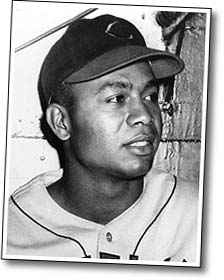
------------------------------------------------------------------
The New York Times and other leading newspapers carried stories last week about the death at age 79 of Larry Doby, who, after graduating from East Paterson High, went on to become a great baseball player and starred for the Cleveland Indians. A quiet man, not as flamboyant as Jackie Robinson, he was the first man of his color to play in the American League and after his retirement was voted into the Baseball Hall of Fame in Cooperstown.
The fellow who from his position in right field witnessed first hand Larry Doby's athleticism was Vince O'Neil. Vince has not as yet been elected into the Hall of Fame.
Thursday, April 10, 2003
May 21, 2003
VOTER MANIPULATION WITH THE AID OF TELEVISION HAS THE CAPABILITY OF DESTROYING DEMOCRACY --- It is becoming more and more apparent that the Bush administration has attained an extraordinary level of proficiency in tightly controlling the President's image. His handlers go to great lengths to portray him in the most favorable light possible. They are aware that the vast majority of Americans do not study the issues but arrive at their opinions largely through news snippets on their television screen. The remote control device is the viewer's defense against boredom. Lengthy political discourse by learned talking heads is of interest to only a small percentage of Americans.
Bush and Cheney have enlisted an extremely savvy group of advisors. Aware of the love affair Americans have with the macho image of the cowboy, the President is frequently photographed outdoors wearing western boots that remind viewers of his Texas connection. Although he has never been in combat or served in any war zone, President Bush attracted widespread publicity when he flew as a passenger in a Navy fighter plane that landed on an aircraft carrier. Unlike such former Presidents as Jimmy Carter, who often was seen wearing a homely cardigan sweater, when George Bush makes a formal address on television his suit,shirt and tie are carefully color coordinated and his overall appearance creates an aura of decisiveness and authority.
Virtually every speech made by the President is designed, not to honestly inform, but to manipulate his audience. He has no hesitancy in justifying the direction he wants to take the country by saying, without any factual basis, that his program is what "the American people" demand. In recognition of the limited attention span of his audience, he repeats the same phrases over and over again. His messages are frequently punctuated by buzz words such as "weapons of mass destruction" and pious platitudes like "God bless America."
As one who has been a life long Democrat, and by most standards a liberal one at that, I am of course vulnerable to the charge that my criticism of the Bush/Cheney strategy is little more than sour grapes. It is possible I am motivated by an element of jealousy. But I am moved by much more than that. When former President Dwight D. Eisenhower left office he warned Americans of the growing influence of the Military Industrial Complex. He was concerned that the greed of the munitions makers could lead the nation into war. I believe Eisenhower's worry remains extremely relevant today. It is my opinion that the proliferation of new weaponry tied in with large campaign contributions made to the Republican party played a not insignificant role in the decision of the Bush administration to invade Iraq.
I do not rermember any President in my lifetime being so in thrall of the nation's wealthy. The record is undeniable. The Bush administration has bestowed benefits upon the petroleum industry while ignoring energy conservation, relaxed regulations protecting public land, rejected international air quality controls, and prioritized the prosperity of business interests over our country's need to put in place an affordable health care system for all our citizens.
How is our democratic system threatened by all this? The answer is readily apparent. The major information provider in our country is its system of paid television. It is extremely expensive for a candidate to purchase advertising time on tv. When Bush tilts our national government to favor big business, he expects and is rewarded by a quid pro quo. It is widely believed that Bush beat Gore in Florida because of voting irregularities. While this was a factor, the main reason behind Bush's national victory was money. According to the Federal Election Commission, Republicans raised 715 million dollars in the 2000 campaign while Democrats raised 528 million dollars. This spread of nearly 200 million gave Republican candidates an immense advantage in a close election and was the major reason why we have a Republican President and a Republican Congress.
George Bush is now about to embark on a fund-raising journey across the nation. His supporters hope he will raise as much as 200 million. His success in pushing through Congress a 350 billion dollar tax cut favoring the very rich should make this objective easily realizeable. He will most certainly have a formidable head start over whoever emerges from the Democratic prirmaries. The financial advantage held by Republicans over Democrats will very likely be much greater in 2004 than it was in 2000.
What we know is that money buys television and that in a very real sense television is the prime ingredient for electoral success. As the money gap between the parties and their candidates widens, the democratic process becomes increasingly distorted. The McCain-Feingold law, designed to control campaign expenditures, is under attack in the courts and its impact is yet to be determined. In the meanwhile, George Bush, under the tutelage of his crafty and cynical brain trust, is making a great deal of hay while the sun shines.
Vince --- urges you to open your individual wallet and support the candidate of your choice.
April 20, 2003
MY REVISED IMPRESSION OF THE MEXICAN CHARACTER --- Yes, I abjectly confess that as a boy growing up in the 1930's, I was influenced by cowboy movies depicting lazy Mexicans who would never do today what they could do manana. While their northern neighbors were portrayed as men of action, Mexicans were seen in their sombreros, snoozing under a tree.
Having but this day returned from Cabo San Lucas at the southern tip of the Baja peninsula, I wish to now report that this characterization is false. I stayed at a most pleasant resort that was beautifully landscaped. When the temperature reached the high eighties, causing me to retreat to the swimming pool or my air conditioned room, Mexican men on the hotel staff were unceasingly at work removing weeds and tending to the flowering shrubs. Others were out on the ocean instructing American tourists how to pull in game fish. Their skill and alacrity made the difference between a big catch and an all day boat ride. I would be amiss if I failed to praise the Mexican women who cheerfully made up the rooms while we hotel guests were at play.
So, my Mexican amigos, I apologize on behalf of all American tourists for these false characterizations. You have my sincere respect and friendship.
Vince --- con agradecimiento
April 10, 2003
LIBERALISM --- There was a time in America when being referred to as a liberal" was considered a compliment. After all, Franklin D. Roosevelt, while despised by a strident minority, was elected four times to the office of President and his implemenation of an array of governmentally financed social programs caused him to be greatly admired by millions who were suffering from the great depression. He was thought of as a liberal as was his successor, Harry S. Truman who unsuccessfully championed a national health insurance program. With the exception of William Jefferson Clinton, Republicans have occupied the White House ever since Ronald Reagan ended Jimmy Carter's presidency. Republican success has been made possible by the infusion of tremendous sums of money flowing from corporations and other wealthy special interests into the coffers of conservative Republican candidates. There has been a quid pro quo. Republicans in office have in turn backed programs tending to reverse the social gains made under prior Democratic administrations. For example, with the aid of monies from the insurance and health care lobbies, Clinton's badly needed proposal to provide medical care for all citizens was torpedoed by cleverly produced negative television advertising. Liberals in government have been ridiculed as wimps and until recently as Communist sympathizers. But have the Republicans and their well heeled contributors gone too far? Has excessive executive compensation in the face of a stock market decline and massive job layoffs aroused resentment among the voters? Are the links between high level officials in the Bush administration and petroleum interests attracting attention? Is the widening gap between the super-rich and the poor and middle class no longer tolerable to right thinking citizens? America cannot long occupy the role of world leader if greed continues to be our highest national value. George Bush ran on the fraudulent promise that he was a "compassionate conservative." Early indications indicate there are a number of progressive minded Democratic candidates seeking their party's nomination for the office of President. Indications are that the word "liberal" will once again regain its respectability.
April 9,2003
BULLIES IN MOTOR VEHICLES PROLIFERATE --- Have you noticed that more cars and trucks are tailgating than was the case just a few years ago. I think it is due to a number of factors which I shall list, not necessarily in order of priority. Television advertisements feature high horsepower automobiles careening around curving, narrow roads at great speed. To be looked upon as the owner of such a machine is touted as a source of justifiable pride. It is essentially about power. This sense of supremacy over other motorists is heightened if the vehicle is not only fast but large and imposing. A curious development is the fact that more and more young women seem motivated to drive recklessly on expressways, whether they tailgate or pass you at 80 miles an hour in a tiny Hundai or an imposing SUV. Where did this unpleasant character trait come from? Does this aggression remain with them after they exit their vehicle or is it only apparent when they are behind the wheel? The other menace on the road is of course the tradional macho redneck in a pickup truck that is built "like a rock." He would not be seen dead in a compact car. The prospects for highway sanity are bleak. Ever since the war with Iraq has been underway, large sums of TV advertising is spent on promoting the "Hummer." For those unfamiliar with the ad, this machine is a squat, ugly and squared SUV. It resembles a military vehicle and appears to be as invulnerable as a tank. Buyers of the Hummer will waste little time in going to war with all of us who fail to swerve onto the shoulder upon seeing their approach in the rear-view mirror. Given the national mood, It would be unpatriotic for us to do otherwise.
April 8,2003
AN UNDERLYING LIFE MOTIF --- It has of late been determined that the universe is expanding at whirlwind velocity and is not contracting as was previously believed by our leading scientists. This factoid can be an object lesson for all of us to follow. If such an erudite group can have been so completely wrong about the very foundation of the universe, how many of our other long held beliefs are untrue? As this blog progresses (and I hope it does not stall prematurely),I will try to discuss some changes that seem to the writer to be significant but which have largely escaped widespread notice. It will also be a challenge and a diversion to try to predict what will come but which has not as yet appeared on anyone's radar screen.
CANADIANS HAVE DETERRED GUN VIOLENCE --- Canadians have always had stronger firearms regulations than the United States. Since the 1930's, there has been the requirement that all handguns be licensed and registered. In 1995 a law was enacted mandating the registration of rifles and shotguns as well. Gun violence in Canada is but a fraction of the carnage that firearms cause in the United States. According to FBI statistics the murder rate with handguns in the United States is 14.5 times the Canadian rate while the murder rate without handguns is roughly equivalent (1.8 times) to that of Canada.
Why does the National Rifle Association deny that which is patently obvious? All firearms (which in reality are weapons of mass destruction) should be registered and be distributed only to rational, law-abiding persons who can establish a reason why they should be allowed to own a gun. A test and a license are needed to lawfully operate a motor vehicle on our public highways. It is foolhardy for society to require anything less when an individual seeks to possess a device expressly designed to kill.
Wake up America to the falsifications of those who profit from the sale of guns! Tell your Congressman you want greater protection from gun violence.
Vince on target
April 7, 2003
EDUCATING OUR CHILDREN --- All candidates for public office will agree that all our country's schools, whether they be located in a wealthy suburb or an impoverished urban slum, are entitled to be given the resources needed to create a positive learning experience for each and every pupil, No student should be denied the opportunity to thrive and develop in our ever-changing, competitive world. In the past, dollars spent by our national government for education, be it on Head Start for little ones or the G.I. Bill of Rights for veterans, have reaped tremendous benefits for the individual participants and the nation as a whole. Today we face a great disparity in the quality of education available to the haves as compared with those who need it most, the have nots. A strong infusion of monies into impoverished urban and rural schools is urgently required. Yes, a mind is a terrible thing to waste. The solution lies in a reordering of national priorities. Tell President Bush to divert a healthy portion of his proposed 700 billion dollar tax cut, designed mainly to benefit the super rich, into public education. If he were to astonish us all by doing this, he would be going a long way toward fulfilling his thus far ignored campaign pledge to "leave no child behind."
Vince's grandchildren
Email your comments: loonwatch_1999@yahoo.com
 Tranquil Canadian Setting
Tranquil Canadian Setting
